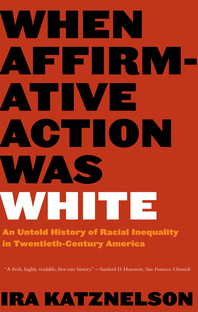
Some people believe we are in a “post-racial” era, especially following the election of President Obama. A recent article in The Atlantic, however, draws on social science research to explain how attempts to be “post-racial” or “race-neutral” can actually exacerbate racial disparities. Article author Adia Harvey Wingfield draws on research from political scientist Ira Katznelson, as well as work by sociologists Leland Saito and Traci Schlesinger, to describe the ways that seemingly neutral economic and criminal justice policies can and do work to maintain systems of racial inequality.
Katznelson’s book, When Affirmative Action Was White, demonstrates how federal policies like the G.I. bill, which were meant to help all American veterans returning home from World War II, mainly benefited whites. This racial discrimination occurred because it was administered by states, and Southern states distributed the G.I. bill through systems built on segregation. Even outside of the South, the bill’s job training components and affordable home loans were administered discriminatorily. As Wingfield states,
“The end result of all this is what Katznelson describes as affirmative action for whites. This was not because Congress wrote legislation explicitly intended to disenfranchise veterans of color; rather, the G.I. Bill — like many of the other policies Katznelson describes in his book –was written as race-neutral and specifically stated that all veterans were eligible. As Katznelson shows, the law didn’t fully deliver on its promise because it didn’t devote any special attention to the racial dynamics that undergird employment, homeownership, and education.”
Similarly, Saito’s book, The Politics of Exclusion, demonstrates how “race-blind” economic policies in cities can have serious repercussions for communities of color. And Schlesinger’s research shows that criminal justice policies, such as mandatory minimum sentences, are actually applied with significant racial disparities. Wingfield concludes,
“Overall, the work of Saito, Katznelson, and Schlesinger offers a cautionary note about what can happen when those in charge of making policy abandon identity politics and ignore entrenched inequalities based on race, gender, ethnicity, and other categories.”

Comments 1
Emily M — June 22, 2023
Is is so interesting to find out about the complexities of measuring and understanding identities. It sheds light on the challenges and nuances involved in defining and quantifying such diverse and multifaceted identities. I am writing a paper about Diversity in my society, and I was looking for reliable and professional assistance online and discovered more information and reviews about their services at https://www.yelp.com/biz/edubirdie-wilmington resource. It is always a great idea to find someone who can describe the challenges in defining and quantifying the identities, acknowledging their diverse and multifaceted nature in the best possible way.